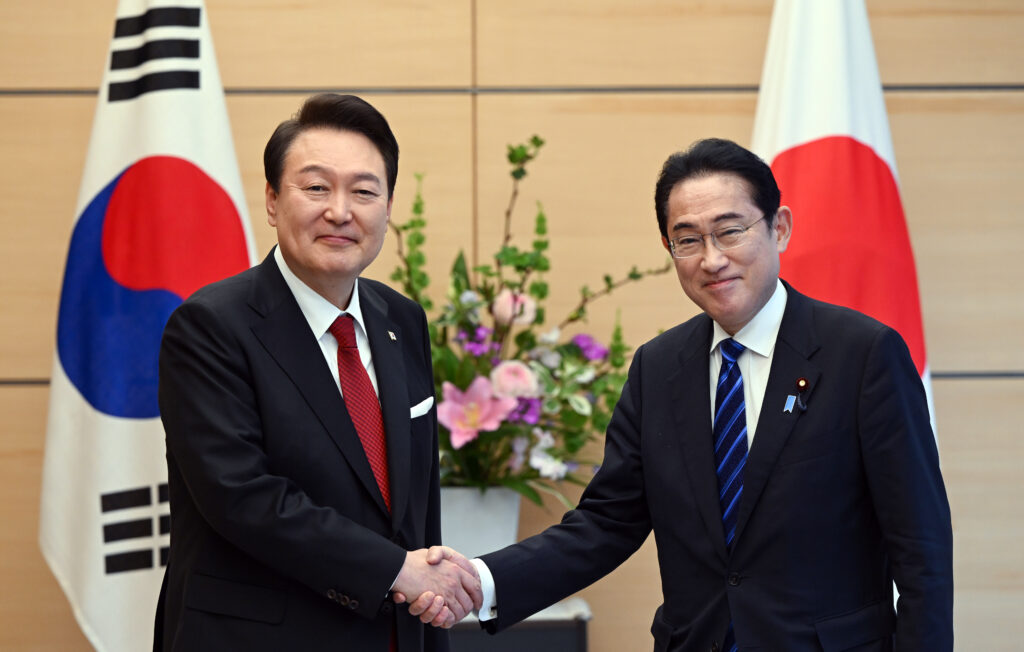The Peninsula
2023 in Review: Navigating the Complex Waves of Korea-Japan Relations

President Yoon Suk Yeol won office after promising to revitalize bilateral relations with Japan, a goal he has made significant efforts towards. On both the national and personal level, the relationship has a much warmer tone compared to the frigidness of the Moon-Abe years. But is this just the upward turn before the eventual decline in the cyclical nature of the bilateral relationship? While significant progress has been made in easing the tension between Seoul and Tōkyō, perennial historical issues will be challenges in the new year.
Resolving the forced labor issue was an early success for the Yoon administration. Back in March, the Korean Ministry of Foreign Affairs announced its plan to compensate forced laborers under the Japanese occupation. Korean companies that had received Japanese money after normalization would contribute to a fund that would take the place of direct payments from Japanese firms and avoid the liquidation of their assets. Japanese government officials also said that while they were not required to, Nippon Steel and Mitsubishi Heavy Industries were able to contribute to the fund in line with the Korean court decision. While the Korean public did not approve of the plan, most of the families of the former laborers that had won court decisions accepted the decision. This breakthrough set the stage for the next success of President Yoon’s efforts.
The start of diplomacy heralded the warm, personal tone of Korea-Japan relations. President Yoon made a trip to Japan in April, the first such visit by a Korean president since 2011. He received much hospitality from Prime Minister Kishida Fumio, where the two bonded over beer, soju, and sake, while also enjoying food from Rengatei, a restaurant in the upscale Ginza district that President Yoon had visited before. A month later, Prime Minister Kishida reciprocated with a trip to Seoul, the last visit being in 2018. Although he did not offer a new apology for the occupation, Prime Minister Kishida reaffirmed previous Japanese government statements during a join press conference with his host. Since then, diplomacy between Korea and Japan have become stronger, culminating in the August Camp David summit. The image of a Korean and Japanese leader standing next to each other is almost unimaginable given recent history.
Finally, the G7 summit hosted in Hiroshima was another positive development. President Yoon was the fourth Korean leader to participate in the confab, where he advanced his vision of Korea as the “global pivotal state.” It also gave him another chance to meet with his Japanese counterpart. Other leaders visited the Hiroshima Peace Memorial Museum, but President Yoon was accompanied by Prime Minister Kishida to a cenotaph that is dedicated to ethnic Koreans that were killed in the blast. It was a powerful moment, connecting Japan’s modern pacifism with its history as an empire.
But obstacles stemming from history are poised to arise again. At the end of November, the Seoul High Court overturned a lower court ruling and ordered the Japanese government to pay 200 million won as compensation to Lee Yong-soo and other surviving comfort women. Predictably, Japanese Foreign Minister Yoko Kamikawa said the decision was “extremely regrettable” when she met with Foreign Minister Park Jin in Busan. He is reported to have said he would continue working with the Japanese side, and reaffirmed Korea’s commitments under the 2015 comfort women agreement. It remains to be seen how either Korea or Japan will navigate handling this most important and sensitive issue.
President Yoon has overseen a rapid change in the tone of bilateral relations between Korea and Japan. The bar for success was fairly low, given the deterioration under both President Yoon and Prime Minister Kishida’s predecessors. But public reporting suggests that the president has been successful in establishing a working relationship with his Japanese counterpart and is truly earnest in his desire to work cooperatively with Japan. Although challenges remain, 2023 will be a bright spot in this complicated relationship.
Terrence Matsuo is a Non-Resident Fellow at the Korea Economic Institute of America. The views expressed here are the author’s alone.
Photo by Kang Min Seok on the Republic of Korea Flickr
